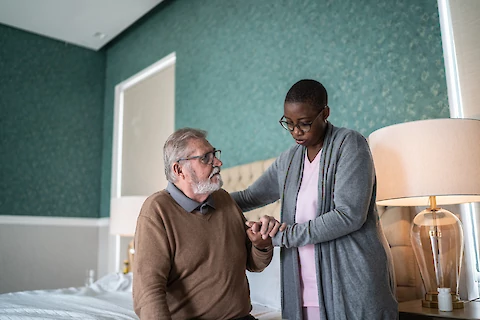
Parkinson's Disease (PD) is a neurological disorder characterized by motor and non-motor symptoms of varying intensities. The disease usually progresses over time, causing greater difficulties to live life normally. For seniors diagnosed with PD, daily challenges can be particularly difficult to overcome due to their weakened physical and mental abilities. Take a look at some of the most common symptoms faced by sufferers of Parkinson's Disease, particularly as the disease continues to advance.
Symptoms of Advanced Parkinson's Disease
The motor symptoms of advanced Parkinson's Disease include slow and stiff movement, trouble controlling body movement (such as walking or speaking), tremors, difficulty swallowing, and changes in posture. Non-motor symptoms include anxiety, depression, fatigue, constipation, and sleep disturbances. As the disease progresses further, these symptoms may become increasingly problematic for many sufferers.
Challenges of Living with Parkinson's Disease
People living with Parkinson's Disease can face a variety of physical, mental, and social challenges due to the advancing symptoms.
Physical Challenges: The weakening of motor skills that comes with advanced PD can lead to difficulty with everyday activities such as dressing, bathing, grooming, and eating. Due to the progressive nature of PD, these activities may become increasingly difficult over time for those living at home without assistance.
Mental Challenges: Many people struggle emotionally when faced with an ever-advancing disease like PD. Feelings of helplessness or depression are relatively normal reactions in this situation. In some cases, dementia can develop as a result of long-term cognitive impairment caused by Parkinson's Disease.
Social Challenges: Those facing mobility issues often experience when it comes to attending events or participating in hobbies they once enjoyed. Frequently, that means they suffer from a high level of social isolation as sufferers of Parkinson's Disease miss out on many key parts of their lives outside their own homes. They often struggle with feeling disconnected from friends and family members, particularly if they frequently have to miss out on social activities.
How to Help a Loved One with Parkinson's Disease
Since Parkinson's Disease is progressive, it is important to provide consistent care and support for those living with the condition. Here are some activities you can do to help someone cope with Parkinson's Disease:
Exercise: Exercise can improve mobility, flexibility, and balance. Low-impact exercises such as walking, swimming, or cycling may be safe options for seniors suffering from PD. Consider regularly meeting a loved one with Parkinson's Disease for regular activities together.
Diet: Eating a healthy diet helps keep sufferers of PD strong, as certain vitamins and minerals have been proven to slow down the progression of the disease. Be sure to talk with their doctor about recommended nutrients. Having meals together or helping your loved one prepare meals can make a big difference in overall nutrition and may aid in the progression of the disease.
Social Support: A big factor in managing stress levels associated with Parkinson's Disease is socialization - especially when movement becomes more difficult over time. Make an effort to stay connected by talking on the phone or making video calls often if visits are too challenging. Being able to catch up regularly will help them feel less isolated at home.
Practical Support: Providing practical assistance with tasks like laundry and meal prep can help Parkinson's sufferers stay in their homes for as long as possible. If you can't offer that support alone, working with an in-home senior care provider can help fill in many of those gaps.
Provide the Assistance a Loved One with Advanced Parkinson's Needs
As Parkinson's Disease advances, having the right support on hand becomes increasingly critical. At Senior Helpers Fort Lauderdale, we can provide a variety of in-home support services that can help seniors stay at home longer. If you live in Fort Lauderdale, Pompano Beach, or Coral Springs, contact us to learn more about our in-home care services.